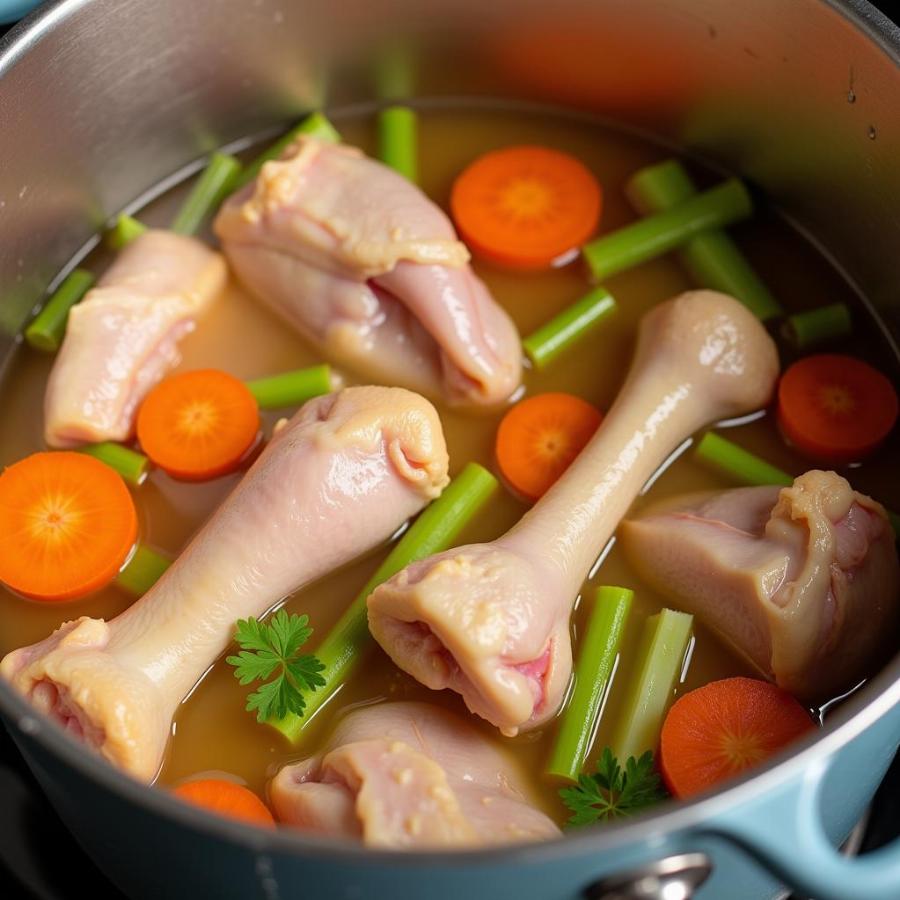Dog chicken broth has become a popular addition to many canine diets, but is it truly beneficial? This article dives deep into the world of chicken broth for dogs, exploring its potential benefits, risks, and best practices for safe and healthy consumption. We’ll cover everything from choosing the right type of broth to understanding when it’s appropriate to offer it to your furry friend.
The Benefits of Chicken Broth for Dogs
Chicken broth can be a tasty and hydrating treat for dogs, especially during illness or hot weather. It can also entice picky eaters, adding flavor and moisture to their food. Furthermore, the broth can be a source of essential electrolytes and minerals, helping to maintain proper hydration. For dogs recovering from surgery or experiencing digestive upset, chicken broth can be a soothing and easily digestible option.
Chicken Bone Broth vs. Regular Chicken Broth: What’s the Difference?
While both types of broth offer hydration, there are key differences. Chicken bone broth, made by simmering chicken bones, contains collagen, glucosamine, and chondroitin, which can support joint health in dogs. Regular chicken broth, on the other hand, is typically made from cooked chicken meat and offers fewer of these benefits. Understanding this distinction is crucial for choosing the right broth for your dog’s specific needs.
 Chicken Bone Broth for Dogs
Chicken Bone Broth for Dogs
Can Dogs Eat Chicken Broth Every Day?
While chicken broth can be a healthy addition to a dog’s diet, it shouldn’t replace their regular food. Offering it daily could lead to an imbalance in their nutrition. It’s best to use chicken broth as an occasional treat, a flavor enhancer, or a hydration boost when needed. Consult your veterinarian to determine the appropriate amount and frequency for your dog’s individual needs.
Choosing the Best Chicken Broth for Your Dog
Not all chicken broths are created equal. Avoid broths containing onions, garlic, or excessive sodium, as these ingredients can be toxic to dogs. Opt for low-sodium or unsalted varieties, preferably organic and free of artificial flavors and preservatives. Can dogs eat chicken broth made at home allows for complete control over ingredients, ensuring your dog receives a healthy and safe treat.
Is Chicken Broth Good for Dogs with Upset Stomachs?
Yes, chicken broth can often be soothing for dogs experiencing digestive issues. The bland and easily digestible nature of the broth can help settle their stomachs. However, if your dog’s digestive problems persist or worsen, consult your veterinarian immediately.
When Should You Avoid Giving Your Dog Chicken Broth?
If your dog has underlying health conditions, such as kidney disease or heart failure, consult your veterinarian before offering chicken broth. The sodium content, even in low-sodium varieties, could exacerbate these conditions. Is chicken bone broth good for dogs with these conditions needs careful consideration.
Conclusion
Dog chicken broth can be a healthy and enjoyable addition to your dog’s diet when offered in moderation and with careful consideration of its ingredients. By understanding the differences between bone broth and regular broth, choosing high-quality options, and consulting with your veterinarian, you can safely incorporate this tasty treat into your furry friend’s routine. Best chicken broth for dogs are those made without harmful ingredients.
FAQ
- Can puppies have chicken broth? Yes, but in small amounts and after consulting with your veterinarian.
- Can I freeze chicken broth for my dog? Yes, freezing is a great way to preserve homemade broth.
- How much chicken broth should I give my dog? Consult your veterinarian for guidance based on your dog’s size and health.
- Can I add chicken broth to my dog’s dry food? Yes, it’s a great way to add flavor and moisture. Chicken broth for dog can make dry kibble more appealing.
- Is homemade chicken broth better than store-bought? Homemade broth allows for better control over ingredients, but store-bought low-sodium options can also be suitable.
- What are the signs of sodium toxicity in dogs? Excessive thirst, vomiting, diarrhea, tremors, and seizures are potential signs.
- Can I give my dog chicken broth if they are on a special diet? Consult your veterinarian to ensure the broth doesn’t interfere with their dietary restrictions.